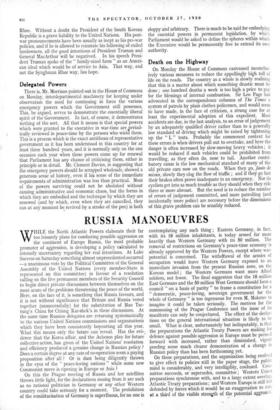Death on the Highway
On Monday the House of Commons canvassed inconclus- ively various measures to reduce the appallingly high toll of life on the roads. The country as a whole is slowly realising that this is a matter about which something drastic must be done ; one hundred deaths a week is too high a price to pay for the blessings of internal combustion. Sir 'Leo Page has advocated in the correspondence columns of The Times a system of patrols by plain clothes policemen, and would seem to have made, in the face of criticism, a strong case for at least the experimental adoption of this expedient. Most accidents are due, in the last analysis, to an error of judgement by an adequately qualified driver rather than to a generally low standard of driving which might be raised by tightening up the " L " tests. Probably the commonest context for these errors is when drivers pull out to overtake, and here the danger is often increased by slow-moving heavy vehicles ; it would be reduced if such vehicles could be prohibited from travelling, as they often do, nose to tail. Another contri- butory cause is the low mechanical standard of many of the old private cars now on the roads. When they go, faute de mieux, slowly they clog the flow of traffic ; and if they go fast their brakes often prove inadequate in an emergency. Nor do cyclists get into as much trouble as they should when they ride three or more abreast. But the need is to reduce the number of errors of judgement committed, and more patrolling (and incidentally more police) are necessary before the dimensions of this grave problem can be sensibly reduced.


















 Previous page
Previous page